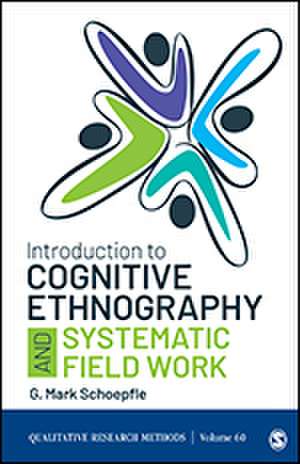Introduction to Cognitive Ethnography and Systematic Field Work: Qualitative Research Methods, cartea 60
Autor G. Mark Schoepfleen Limba Engleză Paperback – 21 dec 2021
Din seria Qualitative Research Methods
-
 Preț: 238.43 lei
Preț: 238.43 lei -
 Preț: 305.28 lei
Preț: 305.28 lei -
 Preț: 263.47 lei
Preț: 263.47 lei -
 Preț: 271.07 lei
Preț: 271.07 lei -
 Preț: 289.47 lei
Preț: 289.47 lei -
 Preț: 289.18 lei
Preț: 289.18 lei -
 Preț: 287.83 lei
Preț: 287.83 lei -
 Preț: 287.55 lei
Preț: 287.55 lei -
 Preț: 288.08 lei
Preț: 288.08 lei -
 Preț: 133.83 lei
Preț: 133.83 lei -
 Preț: 278.01 lei
Preț: 278.01 lei -
 Preț: 279.48 lei
Preț: 279.48 lei -
 Preț: 279.85 lei
Preț: 279.85 lei -
 Preț: 277.06 lei
Preț: 277.06 lei -
 Preț: 279.67 lei
Preț: 279.67 lei -
 Preț: 278.74 lei
Preț: 278.74 lei -
 Preț: 277.27 lei
Preț: 277.27 lei - 18%
 Preț: 688.71 lei
Preț: 688.71 lei -
 Preț: 280.21 lei
Preț: 280.21 lei -
 Preț: 279.85 lei
Preț: 279.85 lei -
 Preț: 277.64 lei
Preț: 277.64 lei -
 Preț: 278.38 lei
Preț: 278.38 lei -
 Preț: 279.85 lei
Preț: 279.85 lei -
 Preț: 277.43 lei
Preț: 277.43 lei -
 Preț: 279.48 lei
Preț: 279.48 lei -
 Preț: 279.85 lei
Preț: 279.85 lei -
 Preț: 279.67 lei
Preț: 279.67 lei -
 Preț: 278.38 lei
Preț: 278.38 lei -
 Preț: 279.85 lei
Preț: 279.85 lei -
 Preț: 279.48 lei
Preț: 279.48 lei -
 Preț: 278.01 lei
Preț: 278.01 lei -
 Preț: 279.67 lei
Preț: 279.67 lei -
 Preț: 279.85 lei
Preț: 279.85 lei -
 Preț: 279.85 lei
Preț: 279.85 lei -
 Preț: 280.21 lei
Preț: 280.21 lei -
 Preț: 270.69 lei
Preț: 270.69 lei -
 Preț: 278.93 lei
Preț: 278.93 lei -
 Preț: 278.01 lei
Preț: 278.01 lei -
 Preț: 277.27 lei
Preț: 277.27 lei -
 Preț: 279.11 lei
Preț: 279.11 lei -
 Preț: 270.54 lei
Preț: 270.54 lei -
 Preț: 277.43 lei
Preț: 277.43 lei -
 Preț: 270.54 lei
Preț: 270.54 lei -
 Preț: 278.74 lei
Preț: 278.74 lei -
 Preț: 277.43 lei
Preț: 277.43 lei
Preț: 289.74 lei
Nou
55.45€ • 58.49$ • 46.34£
Carte disponibilă
Livrare economică 10-24 decembrie
Livrare express 26-30 noiembrie pentru 29.21 lei
Specificații
ISBN-10: 1544351011
Pagini: 184
Dimensiuni: 140 x 216 x 16 mm
Greutate: 0.32 kg
Ediția:1
Editura: SAGE Publications
Colecția Sage Publications, Inc
Seria Qualitative Research Methods
Locul publicării:Thousand Oaks, United States
Recenzii
Cuprins
CHAPTER 1 • Orientation to Ethnography and Cognitive Ethnography
Ethnography
Material Culture and Cultural Durability
Kinds of Ethnography
Abductive Reasoning in Cognitive Ethnography
How Ethnography Differs From Journalism
Everyone Is Biased and Must Cope With the Fact
Preparation for an Ethnographer’s Career: Ethnographer as Expert Witness
CHAPTER 2 • Planning and Proposing a Research Project
The Proposal
The Parties Involved: Peer Review and Institutional Review Boards
CHAPTER 3 • The Semantic Unity of the Ethnographic Interview
The Lexical-Semantic Field Theory and the MTQ Schema
Specialized MTQ Interview Techniques
CHAPTER 4 • The Natural History of the Ethnographic Interview
The Natural History of the Interview
Grand-Tour and Mini-Tour Questions About People Through Personal Networks: The Crystalized Structure of a “Snowball Sample”
CHAPTER 5 • Ethnographic Analysis With Complex Logical-Semantic Relationships
Enhancing MTQ Analyses
Analysis of Complex Semantic Relationships
Ethnographic Decision Models: Entering Choice Into VAPs
Applying Decision Models in Cognitive Ethnography
CHAPTER 6 • Language Transcription and Translation
Interview Transcription
Interview Translation
CHAPTER 7 • Observation
Proposed Justifications for Sole Reliance on Observation
Kinds of Observation
The Application of Photography to Interview and Observation
Observation and Evidence
CHAPTER 8 • Writing the Ethnographic Report
Four Major Report-Writing Styles: Descriptive, Analytical, Synthetic, and Case Study
When Schema Are Not Available or Have Not Been Generated
Organizing the Report
A Final Word on Native Coresearchers
References
Notă biografică
G. Mark Schoepfle has devoted his entire career to applied anthropology in federal and tribal government, with an adjunct status in various academic institutions that have often helped support this research.
He received a bachelor¿s degree in anthropology from the University of California, Berkeley, in 1968. Following his military service, he received his Master¿s in 1972 and Doctorate in social anthropology 1977 from Northwestern University, under the anthropological linguist Oswald Werner, his dissertation chair.
His employment in anthropology began with the Navajo Tribal Division of Education. Here, under the supervision of Oswald Werner, he helped train and supervise Navajo researchers, and compile ethnographic reports of the Navajo Nation¿s different school systems. What began originally as involvement with a one-year training and research project evolved into a 14-year research and teaching career on the Navajo Nation. It involved both research and training Navajos as active research participants and analysts, co-publishers, and findings presenters. Beginning in 1974, he was involved with Oswald Werner in developing a researcher¿s training manual that finally became the two-volume Systematic Fieldwork published in 1987. From 1980 to 1984 he also served as Deputy Director of the Northwestern University Summer Field School in Ethnography.
In 1988 he shifted his career interests to auditing and evaluation at the Government Accountability Office, and later the Department of the Interior in Washington, DC. At the Department of the Interior, he has served as cultural anthropologist for the National Park Service¿s program in applied ethnography, and at what is now the Office of Federal Acknowledgment.
